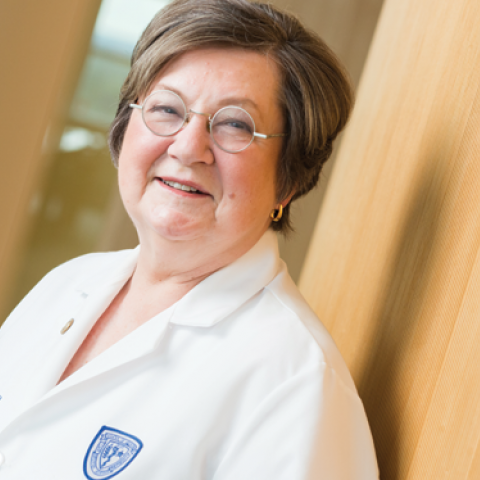Year’s end puts us in a reflective mood… we consider what we have accomplished and the opportunities before us. This has been a year of celebration of our 175th anniversary as a school of medicine as well as of remarkable achievements by our faculty and students.
Our MD program, only one year after recertification, saw all citations and monitorings save one removed. Our 2018 graduates had the best match record ever – all matched, and many to highly competitive programs. The class of 2022 has 55 percent women and 23 percent minorities underrepresented in medicine. Pat Thomas is deservedly proud.
Well on its way to full accreditation, our physician assistant program graduated its first class and every one of the students passed the licensing exam. Congratulations to Cindy Lord and her team, and to our intrepid first-enrolled pioneers.
We have seen the reaccreditation of two of our nutrition programs, led by Jim Swain and Tamara Randall, under the direction of Hope Barkoukis. They came through with flying colors – for example, across the country, only about 53 percent of students in such initiatives typically receive internships, but for our students it was 100 percent. For our genetic counseling program, which Anne Matthews has led to new heights, reaccreditation was supported by an amazing rate of over 90 percent of its graduates now working in the profession. Congratulations to all these programs – we take great pride in your success!
In the community, we have pressed forward to improve infant mortality in Cleveland and extend programs that have helped to control high blood pressure in Cleveland statewide. Mike Konstan’s participation in organizing the Better Health Partnership and the expertise and highly collaborative spirit of Jackson Wright across the state have kept these programs delivering results.
Our programs to ensure access to healthy foods have attracted considerable attention and additional grant funding, including new support from FFAR to Darcy Freedman. Our partnership with the Cleveland Metropolitan School District expanded, with a new grant from NCI and a substantial gift from the Sam Miller Foundation to endow our summer opportunities program. Kudos to Nate Berger and Bob Haynie for obtaining this support.
This was a banner year in research. Total awards to the School exceeded $250 million– the result of many grants to many investigators. A number of discoveries holding great promise were reported.
Our structural biologists, led by Sudha Chakrapani, elucidated the configuration of the serotonin receptor, highly relevant to addiction and depression. Michael Jenkins obtained support for a novel method of controlling the developing heart using laser light. Kevin Cooper and Nicole Ward are unlocking the secrets of psoriasis and its relationship to heart disease. Fabio Cominelli and Mahmoud Ghannoum are studying the micro- and mycobiome of the gut and their relation to gut inflammation. Rafick-Pierre Sekaly and Jonathan Karn are taking innovative routes to eliminating the HIV virus hiding in the body. We’ve been working hard in 2018 to develop new approaches and therapies to better understand the biomedical world around us, and to make a difference. This will continue in 2019.
Our large programs had a spectacular year, led by the Case Comprehensive Cancer Center, which was renewed with all flags flying – congratulations to Stan Gerson and his team. The SPORE in gastrointestinal cancers assisted in the renewal of the BETRnet grant. The device invented by these investigators to sample the esophageal mucosa to diagnose pre-cancerous lesions spun out a company with Sandy Markowitz, Amitabh Chak, and Joe Willis in the lead. A new SPORE in cancer disparities, the brainchild of Li Li, Nate Berger, and Monica Webb Hooper, was funded. Congratulations to all these teams.
Beyond cancer, CTSA entered its third five-year cycle. Its highly successful KL2 training program is a model of interdisciplinarity – we have trained more nurses in this program than any other CTSA, as well as dentists and engineers. Congratulations to Mike Konstan, the overall PI, and the training program directors Raed Dweik and Cliff Harding.
We had great success in the area of Alzheimer’s – two new grants and a major consortium award to Jonathan Haines on the genomics of the disease. Jonathan has the wherewithal and the collaborators to nail down genetic risks for this dreadful disease. We are all aging, so we’re rooting for him! These grants, together with the recruitment of Lin Mei and Wen-Cheng Xiong, provided a major boost to the Cleveland Brain Health Initiative.
One of our central goals has been to see growing numbers of our discoveries reach patients. The chief route from academia to widespread use among the population is through the commercial sector. Therefore, we are pleased to note that in FY18 the SOM spun out seven new companies, four of them with “professional money” – investments beyond friends and family, or SBIRs. If the promise of even one of them is fulfilled, we will be delighted. So far, so good.
Our faculty approved new criteria or reaffirmed ones in place for merit raises. The School was, once again, able to pay more faculty members above the 50th percentile than are paid below the 50th percentile by AAMC standards, meeting a goal set several years ago by the Faculty Council. Cliff Harding was named Distinguished University Professor and Susann Brady-Kalnay and Jonathan Karn were named Distinguished Researchers. Among our outstanding staff, Ginny Petrie was chosen for the Joan Harris award and Christian Essman, Molly Gillahan, and Brinn Omabegho received star performer staff awards.
Bravo to all of our educators, community engagers, researchers, and supporters for what you accomplished in 2018. You deserve a few minutes of quiet satisfaction before we take a deep breath and gather ourselves for the coming year. Let’s raise a glass to all that we will be able to do in 2019.
Happy New Year!
Pam


